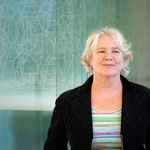Inaugural lecture and festival about ‘good healthcare’
by Jeannette Pols, professor Anthropology of Everyday Ethics
12 June 2023

Jeanette Pols studies the values of healthcare for people with chronic illnesses. How do doctors, nurses, and patients define good healthcare? Much of this depends on the choice for a specific research methodology, an important focus of her work and teaching. ‘Doctors often know a lot about epidemiology, but less about their own clinical bedside practice,’ she says. ‘There’s still a great deal of research to be done in these settings, using ethnographic methods from the social sciences. That’s the message of my inaugural lecture to medical professionals, who often use the evidence-based medicine method. It’s a specific way of looking at and gathering knowledge, and there’s nothing wrong with that, but there’s a lot that it excludes.’

‘What are the obstacles, and how important are these to the patient?’
Take patients with the neurological disease ALS, for instance. ‘There comes a point where they can no longer swallow easily, and have to decide whether to have a feeding tube, which involves surgery. Some ALS patients decide not to, or put it off for as long as possible, despite the health benefits. ‘Having a plastic tube in your stomach is not a nice feeling, and I look at how they deal with it and what factors come into play. That way, I can see where the obstacles and pain points lie, and how important they are to the patient. Qualitative research doesn’t provide easy answers to these questions.’
Patients' needs often lie elsewhere
Furthermore, new technologies, increased digitization and the expectations of self-sufficiency mean we should focus more on values in healthcare, according to Pols. The patient might be on a different wavelength when it comes to their needs and digital applications. It’s often more about relationships and personal communication. ‘For example, an online platform for COPD patients who often feel anxious at night and need someone to talk to, turned out to be very successful.’ But also looking at older heart patients, who may be asked to take new equipment home and take their own measurements. ‘They are often happy to do the measuring themselves, but would rather leave the interpretation to the professionals.’
Pols believes that healthcare policy makers should begin by asking what technological applications can do for the patient, and what kind of care patients should receive. ‘People often invest in new technology for the wrong reasons. They start by looking at the cost savings, and only then do they consider the practical feasibility. If they don’t think carefully about what they want the technology to do, things can go wrong.’
A good knowledge transfer
To ensure that Pols can advise health care professionals with her research findings in a good way, she is in favour of a proper knowledge exchange between social science research and medical practice. ‘The problem is that the kind of research I do isn’t easy to get published in medical journals, because of the differences in methodology. There needs to be a better ‘knowledge transfer’ so that my conclusions get through to medical professionals. So that’s my main task as a professor, and the core message of my inaugural lecture.’
A festival to make the message tangible
This is also the main theme of the Unexpected Subjects festival, to be held later on the same evening in the Amsterdam Public Library (OBA), on the Oosterdok. ‘The festival will help to convey the idea of healthcare excellence and the message of my inaugural lecture to a wider audience,’ Pols enthuses. ‘We’ll work with the audience to try and find ways of tackling complex and topical care issues. It’ll be a fun, accessible event for everyone, a mix of philosophy, art and social sciences.’
Don’t expect to be a passive onlooker, though. ‘The audience will play an active role. If you change the relationship between researchers and their subjects, their relationship with the public changes too, and they get a different sort of knowledge. We’re going to play around a bit with the public and their role, and we’ll be putting them to work, in some cases with an actual fieldwork book.
About the inaugural lecture
Jeannette Pols, professor Anthropology of Everyday Ethics, will give her inaugural lecture on Thursday 29 June. The lecture will be in Dutch and is entitled 'Inzoomen, scherpstellen. Naar een antropologie van alledaagse ethiek in de gezondheidszorg'.
More information, the full programme and to register for the Unexpected Subjects festival: